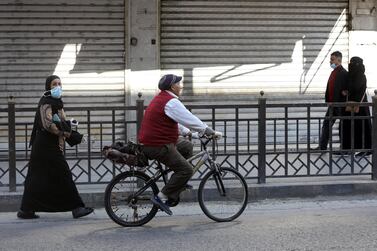Jordan's banks responded to central bank calls to cut interest rates charged to small and medium sized firms and individuals feeling the effects of the coronavirus crisis on Monday with a 1.5 per cent reduction from the end of April.
Monday's interest rate move announced by Jordan's Banking Association, which represents commercial banks, follows prodding by the central bank after monetary authorities cut key benchmark interest rates in mid-March to 2.5 per cent from 3.5 per cent.
The Jordanian economy, like others in the Middle East and beyond, has been hit hard by the coronavirus crisis.
Small businesses are suffering the most, with no income flowing in since a tight one-month lockdown that has brought many sectors of the economy to a standstill.
They say they are getting inadequate government support, and many are worried whether they can keep paying staff.
Tens of thousands of workers have also been without work since the lockdown that has brought construction, workshops and many industries to a standstill.
Economists say loss of income would deepen poverty among a significant number of the country's 10 million inhabitants.
Reflecting these worries, King Abdullah said in a tweet that the government should find ways to provide protection to daily wage earners to help them cope with eroding living standards.
The central bank announced a package to help troubled businesses and individuals by instructing commercial banks to postpone loan payments for companies and retail customers.
More significantly, the central bank slashed compulsory reserves for commercial banks to inject more than 500 million Jordanian dinars ($705m, Dh2.6bn) of liquidity, the first such move in nearly a decade.
Jordanian officials are worried the crisis, which has hit the $5bn-a-year tourism sector, will slash growth projections and deepen an economic downturn.
Finance minister Mohammed Al Ississ said the country's finances will be deeply hurt by a loss of revenue from businesses that will also worsen a chronic budget deficit.
Central bank governor Ziad Fariz said an IMF growth forecast of 2.1 per cent for 2020 was now in doubt, but that it was not clear how far the economy would shrink.
The kingdom, which embarked last month on a four-year, $1.3bn loan programme with the International Monetary Fund (IMF), has appealed for help from its major Western donors.
Tourism Minister Majd Shweikeh announced a more than 30 million dinar aid package for troubled hotels and tourism investors on Monday, and said chain restaurants would be allowed to reopen for online deliveries.







